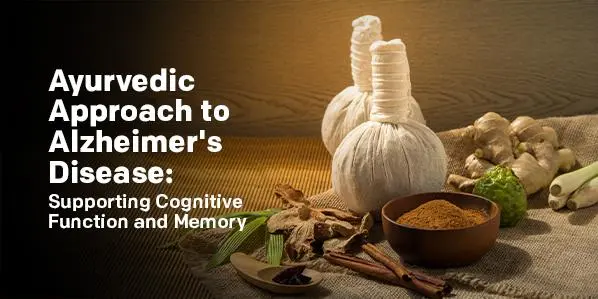Alzheimer’s, a condition that erodes memory and cognitive functions, has been a focus of modern medicine for many years. That being said, Ayurvedic remedies and treatment options can be used to complement modern treatments and offer unique insights into managing this challenging condition.
In this blog, we’ll talk about how ayurveda can help Alzheimer patients.
The Herbal Guardians
The Kayachikitsa Department, a cornerstone of Ayurvedic hospitals, emphasizes restoring balance through herbal remedies, dietary adjustments, and lifestyle modifications. One of the most powerful tools in Ayurveda’s arsenal against Alzheimer’s is its use of herbs. These natural wonders are known for their cognitive-enhancing properties.
Brahmi (Bacopa monnieri)
Often hailed as a brain tonic, Brahmi has been shown to improve memory, reduce anxiety, and enhance cognitive function. Incorporating Brahmi into the diet or as a supplement can be a significant step in supporting brain health.
Ashwagandha (Withania somnifera)
Known for its adaptogenic properties, Ashwagandha helps combat stress, a known risk factor for Alzheimer’s. It also promotes antioxidant activity in the brain, protecting it from the damage caused by free radicals.
Turmeric (Curcuma longa)
The curcumin in turmeric has potent anti-inflammatory and antioxidant properties. It’s believed to slow down the progression of Alzheimer’s and reduce the risk of developing the disease.
When used under the guidance of an experienced Ayurvedic practitioner from a reputable Ayurvedic hospital, these herbs can provide a natural method to support cognitive function and mitigate the symptoms of Alzheimer’s.
Diet: Nourishing the Mind and Body
In Ayurveda, diet plays a pivotal role in maintaining health and balance within the body. For Alzheimer’s, a diet rich in antioxidants, omega-3 fatty acids, and phytonutrients is recommended.
- Antioxidant-rich foods: Include berries, nuts, and green leafy vegetables in your diet. These foods combat oxidative stress, a factor in Alzheimer’s disease progression.
- Omega-3 fatty acids: Foods like flaxseeds, walnuts, and fatty fish such as salmon support brain health and cognitive function.
- Whole grains and legumes: These are excellent sources of complex carbohydrates, providing steady energy and supporting brain health.
Hydration is equally important. Drinking adequate water throughout the day helps in detoxification and maintains brain function.
Lifestyle Practices for Mind and Body Harmony
Regular Exercise
Physical activity is good for the heart and the brain. Activities like walking, yoga, and tai chi improve blood flow to the brain, enhancing memory and cognitive functions.
Yoga and Meditation
Specific yoga asanas (poses) and meditation techniques are highly beneficial in managing Alzheimer’s symptoms. Practices such as Padmasana (Lotus Pose), Tadasana (Mountain Pose), and Bhramari Pranayama (Bee Breath) are known to improve mental clarity and reduce stress.
Sufficient Sleep
A good night’s sleep is crucial for brain health. During sleep, the brain clears out toxins and consolidates memories. Establishing a regular sleep routine can enhance cognitive function and memory retention.
Engaging in Cognitive Activities
Engaging in cognitive activities is crucial in maintaining brain health and can be particularly beneficial in managing conditions like Alzheimer’s disease. These activities stimulate neural connections, potentially slowing the progression of cognitive decline.
Reading
Immersing oneself in books, whether fiction or non-fiction, stimulates different parts of the brain involved in language, comprehension, and imagination. Reading regularly can improve memory, enhance concentration, and expand vocabulary, contributing to a more focused mind.
Solving Puzzles
Puzzles such as crosswords, Sudoku, and brain teasers challenge the brain, improving problem-solving skills and attention to detail. Regular engagement in these activities can enhance cognitive flexibility, allowing the brain to better adapt to new challenges.
Playing Musical Instruments
Learning to play a musical instrument is a complex, enriching activity that simultaneously engages various brain areas. It improves hand-eye coordination, sharpens concentration, and can increase the brain’s ability to adapt to new information—a concept known as neuroplasticity.
Learning a New Skill
Taking up a new hobby or skill, such as painting, cooking, or learning a new language, can significantly stimulate the brain. These activities require concentration, problem-solving, and memory, essential for cognitive health. Learning new skills can also provide a sense of achievement and satisfaction, contributing to emotional well-being.
Conclusion
Through a combination of herbal remedies, dietary adjustments, and lifestyle practices, an ayurvedic hospital in Vadodara and other areas of the country provides a holistic framework for managing the symptoms of Alzheimer’s. The wisdom of traditional herbs like Brahmi, Ashwagandha, and Turmeric, when coupled with a nutrient-rich diet and regular physical and mental exercises, can play a pivotal role in enhancing brain health.
By integrating these age-old practices with modern research, we can forge a path to improved cognitive function and memory, offering hope and support to those affected by Alzheimer’s.





